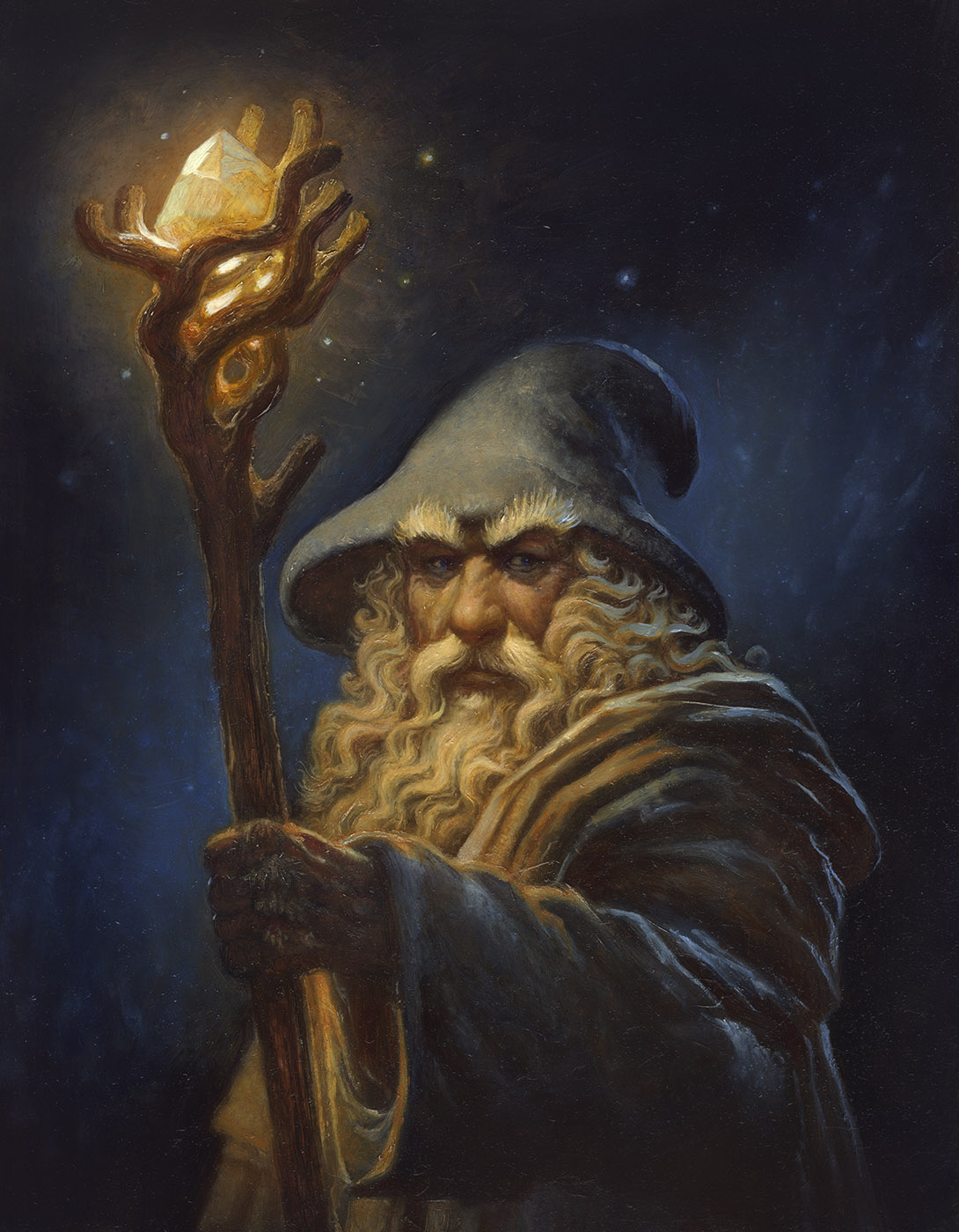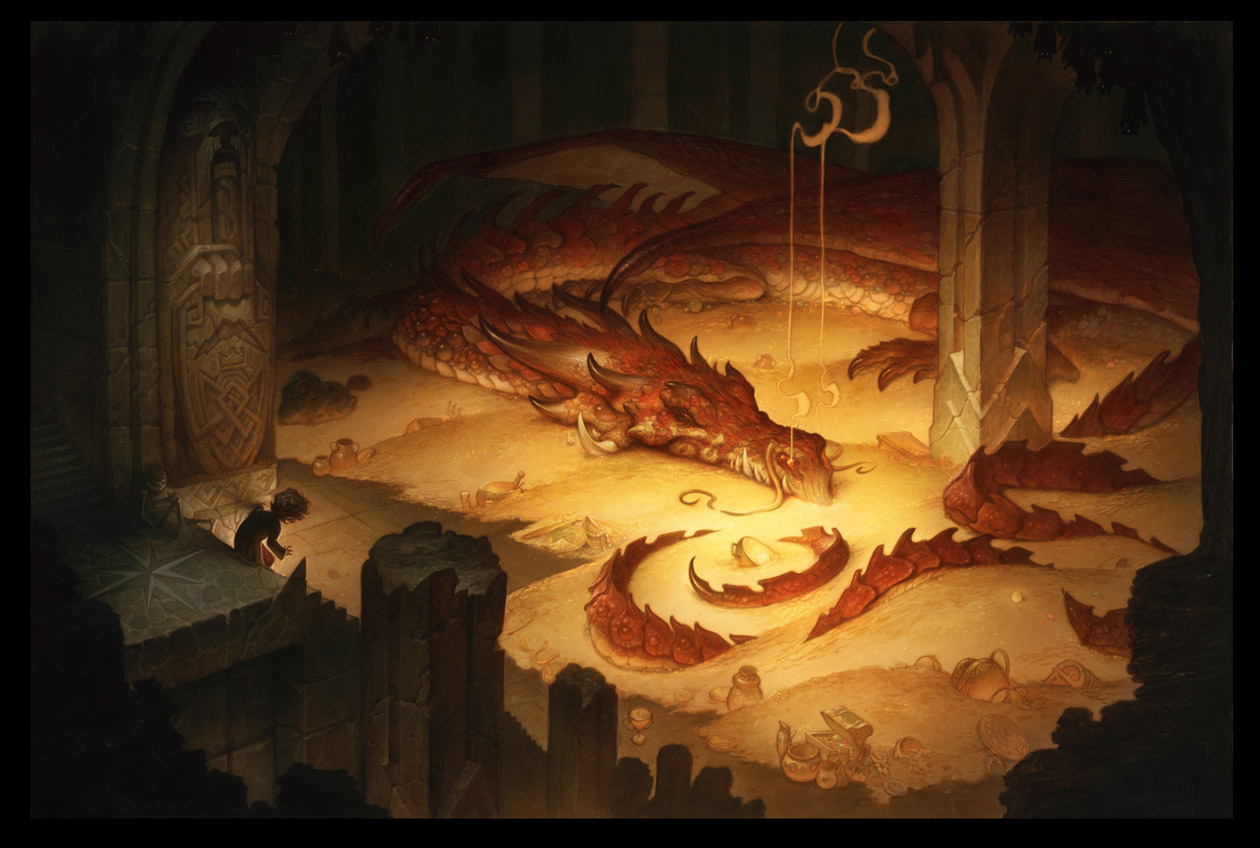A little while back I did a quick sketch of Gandalf in anticipation of the opening of The Hobbit. At the request of a collector I did a finished oil version of it and wanted to share it.

Gandalf Oil
Tuesday, April 2nd, 2013
By Justin Gerard
Oil on panel
11″ x 14″
A little side note for anyone who has followed along with my misadventures in oil these past few years: You have probably heard me complain many times before that I couldn’t seem to work in oil without using solvents, but that if did use solvents, that I would always end up having this allergic reaction where I would grow fangs, claws, and an unruly beehive haircut. I would then of course go roaming about the neighborhood howling at the moon, ravening for meat-flavored things.
This oil was done without the use of any solvents whatsoever. It was done using only walnut alkyd oil, and using only oil pigments that tend to dry faster. (siennas, umbers, pthalos, etc.) So far I haven’t grown a single beehive haircut, which is pretty exciting.
Early sketch on toned paper








Fantastic, Justin. Question: Do you use the toned sketch for your underpainting?
Thanks for the technical information, Justin. I'd been wondering what your current solution to the oils situation had worked out to be. Interesting that you sought out faster-drying pigments – how long does the paint stay comfortably workable with this setup? I've been using the water-mixable Cobras, but even though they take a few days to fully dry, the paint starts to feel tacky pretty quickly…
absolutely brilliant work !!! looking forward for more.
Looks amazing Justin- so glad to see you found a way to work w/oils again. Walnut alkyd oil is awesome stuff. I love almost all the M. Graham oils and use them almost exclusively with a few exceptions (Alizarin Permanent, Gold Ochre which I buy from Gamblin) because of toxicity issues.
Hey Kim! The toned sketch was a little small for painting over, so I decided to just trace the drawing onto a panel.
Hey Dave,
They are comfortable for at least 24 hours. After that, very thin layers will be almost dry, and the rest will be somewhat tacky. As long as they are no slow-drying colors (alizarins, ultramarines, sap green, indian yellow, etc.) then it will dry pretty fast with just the walnut alkyd medium in there.
One thing to note though is that the air in my house is very dry, so paintings tend to dry a little faster anyway. You may find the time a bit different where you are at.
Beautiful sketch and final painting. The info above on the workability of paint is invaluable, thanks for sharing that with us.
On your sketches, are you laying down darks first, then light? Or working in and out with lighter/darker values simultaneously?
I love your work as usual. Why persist with oils if the solvents cause so much problems for you?
Hey David,
Yes, I generally lay down most of my darks first. But I always go in with darks again after adding the whites to strengthen small details and shadows.
Because there is nothing that looks quite like an oil when seen in person for me. I still love watercolor and pencil and digital, but I also really want to be able to do certain projects in oil.
I actually asked this same question over on your personal blog, so you can disregard that one!
Thanks for posting this – it's really making me want to break out the oils again. I think I would really enjoy them if I took more time to actually get comfortable with them.
Great painting! I tend to like the scetch more though- Gandalf seems to be “following his nose” there and what a nose it is 😀 Cool nevertheless
Both sketch and painting are wonderful!
I'm glad you've been able to work around solvents. I haven't got the patience to paint in oils without at least a little Gamsol to clean out my brushes, but the lack of ventilation in my current “studio” (AKA, basement) usually leaves me with a twinge of headache after an hour or two.
Hopefully I don't sound like an advertisement when I say that Golden's Open Acrylics are my new best friends.
Great work, Justin!
Those sure are some eyebrows!
Really cool though. 🙂
Air purifiers for rooms exist, although an industrial one for solvents might be too expensive/noisy to use. There are also filter masks for use with solvents, but they feel weird and take getting used to. And if you need one with goggles it might be more hassle than it's worth. I hope just using a fan and having LOTS of fresh air does the trick for you. That's a great Gandalf!
Great vacation might be your dream. Travel to Bali is not always expensive as there are many international flights providing special rates for early bird booking. There are also many selection of Bali hotels offering special discount rates including Bali villas and budget Bali accommodation
I'm interested!
How long do you find that they stay workable on the canvas, Megan? I use Daler Rowney Cryla heavy body colours along with a home-made wet palette that keeps the paint in it usable for about a week, but on the canvas, it's still a very short window – minutes really. Do you feel that the Golden colors appreciably increase that time? I know the company say it's longer, but I want to know what an artist says… 😀
Hey Dave!
If I'm painting with Golden's OPEN acrylics on a substrate which has been primed to be not very absorbent, the open time can be as long as an hour, depending on paint film thickness and conditions in the room. (FYI, I just use the cheapo throwaway palette papers.) Sometimes they can even take TOO long to dry (which is why the company recommends that the OPEN acrylics not be used for impasto-y applications)!
With Golden's OPEN Acrylics, you do need to make sure you're also using the special mediums they make to accompany them (OPEN Thinner, in particular). The paint works with any regular acrylic mediums, too, but those will proportionally decrease the open time.
It's a crazy paint, for sure. Right out of the tube it's slightly greasy, and thinner than regular heavy-body acrylics. As you are painting, it “tacks up,” but it doesn't skin over. The paint can still be thinned, even removed, using the OPEN Thinner.
Typically I'll establish my underpainting (however many layers that may require) in OPEN Acrylics, then use regular formula acrylics for the thicker, denser modeling and highlights in the final layer.
(I work at an art supply shop, so, yes, I'm a materials über-nerd.)
~ M
Thanks for this detailed reply, Megan, this is exactly what I was curious about. I am definitely going to order some of these (with the mediums) and give them a try. They sound quite interesting… I appreciate the details on your working technique, too!
Wow, this is such an amazing painting! I myself have never used oil before but I've always admired people who did. And congrats on not getting an allergic reaction ! 😀